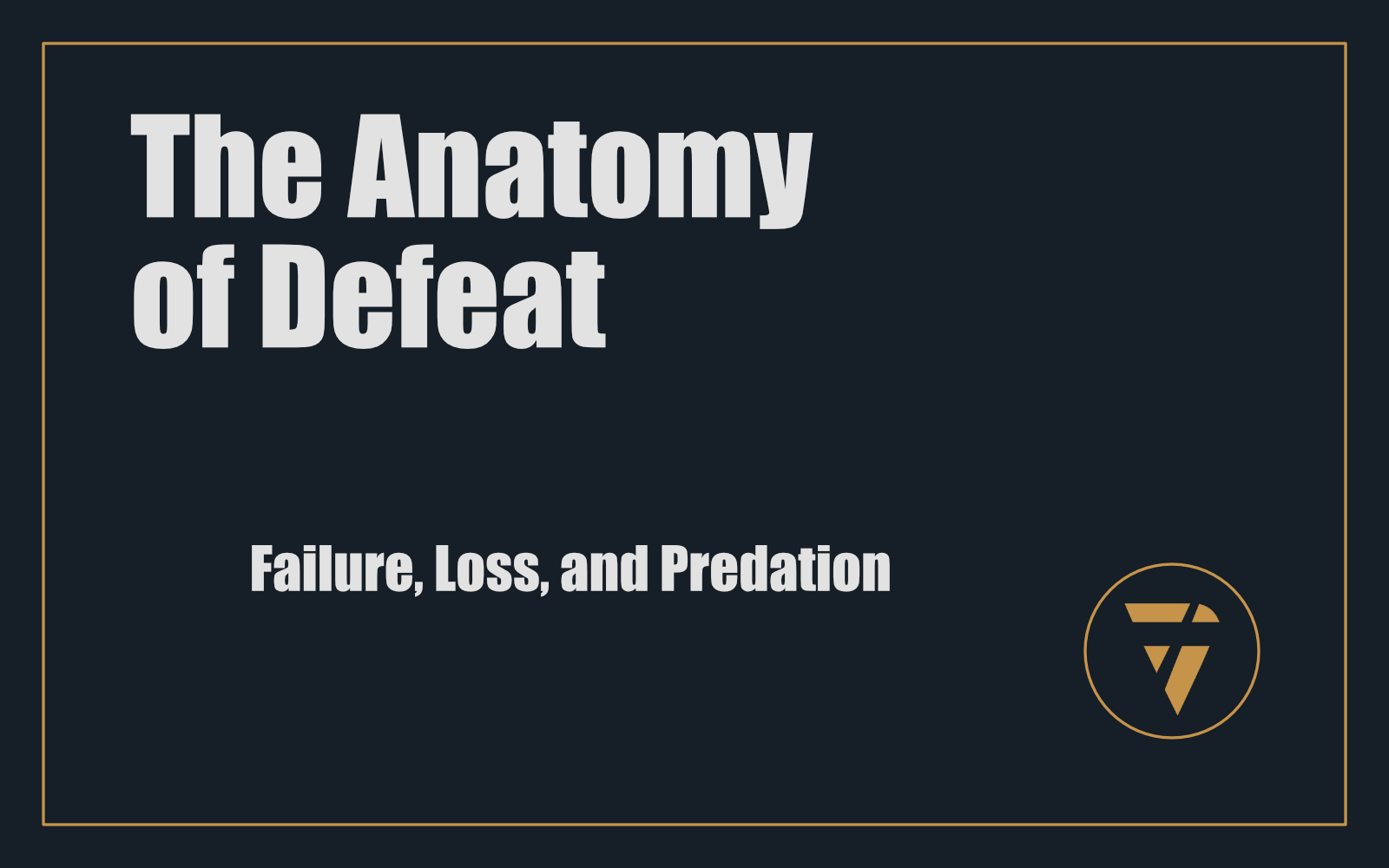The Anatomy of Defeat

Failure, Loss, and Predation
Most people live their entire lives without ever understanding what just happened to them.
They walk through the wreckage of their own history carrying the wrong names for their experiences. They call things “failures” that were not failures. They carry shame that belongs to someone else. They pretend resilience while quietly bleeding out.
And our culture—our business culture, our social culture—encourages this confusion. We love simple labels, because simple labels absolve us of the obligation to look deeper.
They failed.
End of story.
But there is no clarity in that, no justice, and no path forward. If you can’t diagnose the event, you can’t recover from it. You can’t learn. You can’t adapt. And worst of all, you can’t discern when you are responsible and when you are not.
So let’s redraw the map.
There are only three kinds of defeat in life and business: failure, loss, and predation. I know all three.
1. Failure: The Defeat You Create
Failure is personal. It's the mirror.
You failed when you didn’t take the shot.
You failed when you avoided the work.
You failed when you showed up unprepared and reality responded exactly as it should have.
Failure is agency turned inward against yourself. It is self-authored.
It’s missing the sales target because you didn’t make the calls.
It’s blowing the opportunity because you didn’t prepare the deck.
It’s losing the race you never trained for.
There is no shame in identifying failure. In fact, calling it by its true name is the only way to free yourself from its grip. Failure is clean. It’s yours. Own it, and it becomes leverage.
The tragedy of failure is that most people either deny it or drown in it. They lie to themselves to protect their ego, or they spiral into self-loathing. Both are useless.
Failure is simply a signal: you chose not to apply force where it was needed.
And the beauty of failure is that it's fixable. Skills can be learned. Habits can be built. A system can replace self-sabotage.
Failure is the defeat you can turn into fuel—if you don’t lie about it.
2. Loss: The Defeat Reality Hands You
Loss is external.
You did the work. You showed up. You fought the fight. And someone else was faster, better, or better positioned. Or the conditions changed beyond your control.
Loss is when your startup gets outbid by a competitor with more capital.
Loss is when the weather cancels the event you spent six months planning.
Loss is when the market shifts under your feet and your perfect plan becomes obsolete.
Loss is not moral. Loss is math.
It's the universe saying, “Not this time.”
We mislabel loss as failure, and that’s where people break. Because when you treat a loss as a failure, you carry shame you didn’t earn. And shame is heavy. It slows the next attempt. It breeds hesitation, self-doubt, and hesitation’s evil twin: drift.
Loss should teach, not haunt. It shows you the gap between your force and reality. It forces you to see probability, timing, and context.
In life and business, you cannot eliminate loss. You can only reduce its frequency and its cost. Professional operators—founders, investors, athletes—know this. They metabolise loss without self-punishment. They don’t moralise it.
Loss hurts, but it's not rot. It does not live in you unless you feed it.
3. Predation: The Defeat That Is Taken from You
Then there is the third category—the one nobody talks about.
Predation.
This is not failure. This is not loss. This is when something is taken from you.
Your agency stripped. Your access blocked. Your effort devoured.
Predation is the business partner who empties the account and vanishes.
It's the investor who manipulates the term sheet to take your company for pennies.
It's the employer who gaslights you out of a promotion and hands it to their nephew.
It's the system that rigs the game before you even step on the field.
Predation leaves a different scar than failure or loss. It's not instructive. It is invasive.
And yet our culture almost always mislabels it as failure.
“She couldn’t hack it.”
“He went under.”
“They just didn’t have what it takes.”
No one asks: Or were they eaten?
Predation is the silent killer of confidence, because it wears the mask of failure in the eyes of the world. It leaves you questioning your own reality. And if you don’t name it correctly, you will carry a weight that is not yours.
The cure for predation is not self-improvement. It is vigilance, boundary-setting, and structural leverage. You prevent it by controlling your environment, designing for sovereignty, and refusing to hand power to those who haven’t earned trust.
The Cost of Misdiagnosis
The reason this distinction matters is simple: misdiagnosis is fatal.
When you call a loss a failure, you shame the wrong person.
When you call predation a failure, you protect the predator and destroy the prey.
When you call your own failure a loss, you abdicate responsibility and repeat the cycle.
Our culture’s single-bucket approach to defeat creates three quiet tragedies:
- The Shamed: People who were preyed upon or simply lost now carry the stink of failure. They withdraw. They stop trying.
- The Blameless: People who failed but call it “bad luck” never grow. They stay soft. They repeat the pattern.
- The Invisible Predator: The ones who took without earning walk free, ready to feed again.
If you want to live and operate with clarity, you must learn to see the architecture of defeat. Diagnose before you assign meaning.
Ask:
- Was this my failure?
- Was this a loss?
- Or was this predation?
Rewriting the Cultural Script
We live in a culture obsessed with “resilience,” but it’s a hollow resilience built on denial.
We tell people to “get back up” without ever helping them understand what knocked them down.
We give platitudes where we should give maps.
In business, this blindness is even more expensive. Companies die because founders don’t know what they’re fighting. Teams collapse because leaders moralise loss instead of dissecting it. Investors waste fortunes because they can’t spot predation in their own networks.
What we need is a reality-based method for determining the value of effort and the cost of events. And that begins with a simple cultural shift:
Stop calling everything failure.
Name the event correctly. Then respond accordingly.
The Operator’s Playbook for Defeat
If you’re building, leading, or surviving, here’s how you convert this clarity into power:
- Audit Every Event
After any setback, write down the event and classify it: Failure, Loss, or Predation. Don't lie. Do not protect your ego or anyone else’s. - Apply the Correct Remedy
- Failure → Skill, discipline, and systems.
- Loss → Analysis, iteration, probability management.
- Predation → Boundaries, leverage, environment control.
- Build Structural Immunity
Predation only thrives where you are exposed. Audit your contracts, your partnerships, your cash flow, your permissions. Delete the vulnerabilities that let predators feed. - Restore Agency Before Motion
Never sprint from a misdiagnosed event. If you carry shame that isn’t yours, you will bleed it into the next chapter. Clear it. Name it. Only then move.
The Call to Action
If you read this and feel the sting of recognition, it’s because some part of your life still carries the wrong label.
Maybe the business you lost was never your failure.
Maybe the opportunity you missed was always a loss, not a moral judgment.
Maybe the shame you’ve been carrying all these years belongs to someone who took from you and walked away full.
Call it what it is.
Failure. Loss. Predation.
When you name the event correctly, you strip it of its poison. You regain the ability to see the board, to act without baggage, to build without ghosts whispering that you are doomed to repeat the past.
Life is not fair. Business is not gentle. But both are navigable with clarity.
And clarity is the only real resilience.
This is what I’m working on. Tell me what you think, I enjoy the conversation! Subscribe and follow the work in real time.
Thanks!
B

They didn’t fail. They were fed on.
We call everything ‘failure’ so we don’t have to see the predator.
Name the event correctly, or keep carrying shame that was never yours.
PS -






